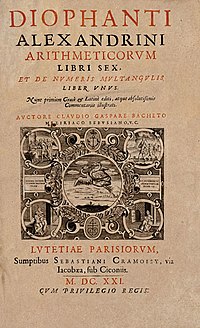Diophantus of Alexandria
Diophantus of Alexandria Ancient Greek: Διόφαντος ὁ Ἀλεξανδρεύς, Díóphantos ho Alexandreús), who lived in the 3rd or 4th century, was an ancient Greek mathematician. He is considered "the father of algebra".
He was the author of a series of books called Arithmetica, many of which are now lost. His texts deal with the resolution of algebraic equations. The Diophantine equation ("Diophantine geometry") and the Diophantine approximation are important areas of mathematical research. Diophantus coined the term παρισότης (parisotes) to refer to an approximate equality. This term was translated as "adaequalitas" in Latin, and became the matching technique developed by Pierre de Fermat to find maxima for tangent lines and functions to curves. Diophantus was the first Greek mathematician to recognize fractions as numbers; thus he allowed positive rational numbers for the coefficients and solutions. In modern usage, the Diophantine equations are usually algebraic equations with integer coefficients, for which integer solutions are sought.
Life
Born in Alexandria, nothing is known for sure about his life, except his age at which he died; this, thanks to the epitaph written in the form of a problem and preserved in the Greek anthology.
Shut up, this is Diofanto's grave: the numbers can show, oh wonder! the duration of your life. His childhood occupied the sixth part of his life; then, during the twelfth part, his cheeks were covered with hair. He spent even a seventh of his life before taking a wife and, five years later, he had a beautiful child who, once attained half the age of his father's life, perished from a miserable death. His father had to survive him, crying, for four years. Of all this his age is deducted.
- x6+x12+x7+5+x2+4=x{displaystyle {frac {x}{6}}} +{frac {x}{12}{frac}{x}{x}}{x}}}} +5+{frac {x}{x}}}}} where the unknown x{displaystyle x} represents the age that fits Diofanto.
According to this, Diophantus passed away at the age of 84. It is unknown, however, in what century he lived. Diophantus dedicates his Arithmetic to a certain Dionysus, who the historian Paul Tannery has suggested could be a bishop of Alexandria who lived in the III. On the other hand, if he were the same astronomer Diophantus who quoted Hypatia (died 415), he would have died before the fifth century; but if they were different people, it is possible to conjecture that he would have lived at the end of that century, since neither Proclus nor Papo mention him, which is difficult to understand in the case of a mathematician who passes for being the western inventor of algebra.
Work
The Alexandrian mathematician owes his fame to his work Arithmetica. This book, which consisted of thirteen books of which only six have been found, was published by Guilielmus Xylander in 1575 from some manuscripts from the University of Wittenberg, the editor adding a manuscript on polygonal numbers, a fragment of another treatise by the same author. Author. The missing books seem to have been lost early as there is no reason to suppose that the Arabic translators and commentators had other manuscripts than those still extant.
In this work he studies equations with variables that have a rational value (Diophantine equations), although it is not a theoretical work, but rather a collection of problems, suitable for integer solutions. Important was also his contribution in the field of notation; Although the symbols used by Diophantus are not as we currently conceive them, he introduced important innovations such as the use of a unique symbol for the unknown variable (στ) and for subtraction, although he kept the abbreviations for powers of the unknown (δς for the square, δδς for twice the square, χς for the cube, δχς for the fifth power, etc.). In his time the concept of polygonal numbers was extended to spatial numbers, represented by families of orthohedrons, pyramidal numbers.
In 1621 an annotated edition of Bachet de Méziriac saw the light of day, an edition later reprinted in 1670 by the son of Pierre de Fermat including the comments that the famous French mathematician had made in the margins of a copy of Bachet's edition that he owned
Impact
The mathematician of the XIX century Hermann Hankel, in his History of mathematics, valued thus his figure: «Diophantus is the father of arithmetic and algebra in the sense with which we practice these sciences; he was the first to operate, that is, to calculate without any geometric representation, using general numerical expressions, the determined formal laws of addition, subtraction, multiplication, division, elevation to powers and extraction of roots».
Eponymy
- The Dharphantic equations (algebraic relations with whole solutions) owe him his name.
- The lunar crater Diophantus bears this name in his memory.
Contenido relacionado
Unit system
Rod (unit of length)
Multiplication


